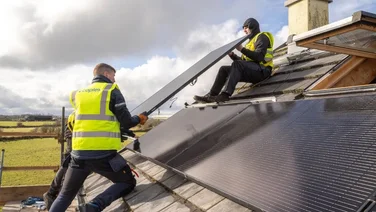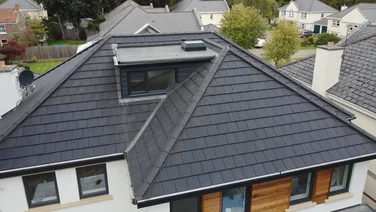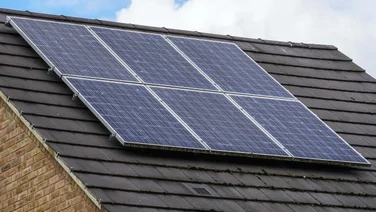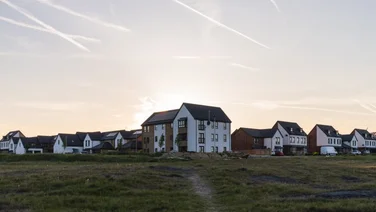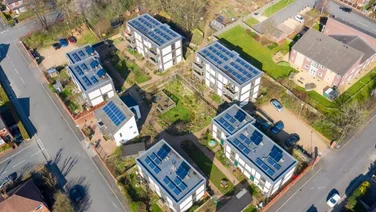✔ A used solar panel can cost as little as £50–£70
✔ Secondhand panels can be a risky investment
✔ An MCS-accredited installer can’t certify an installation with used panels
Installing solar panels of all kinds is becoming an increasingly popular way to combat both climate change and rising energy bills. But there is one major barrier to greater uptake of solar panels – the cost.
In fact, our annual National Home Energy Survey found that 69% of people ranked cost as the most important factor when evaluating which low-carbon product to purchase.
To overcome this barrier, it is tempting to consider buying second hand solar panels, rather than investing in brand new ones.
Second hand solar panels can be ten times cheaper than new ones. While this sounds appealing, there are a few things you should know before you get stuck in – and we’re here to show you.
If second hand panels aren’t right for you, it might be worth getting yourself a set of new solar panels. All you need to do is fill in this quick form with a few details, and our expert installers will be in touch with free tailored quotes.

What’s on this page?
Are second hand solar panels a good idea?
Investing in second hand solar panels isn’t a terrible idea, but you should definitely take your time to consider the quality of the panel before jumping at the chance.
This is because buying second solar panels can be a bit risky. On the one hand, they can remove the barrier of the high initial costs, leading to reduced energy bills and emissions. On the other hand, they might have underlying damage that won’t be obvious to the naked eye, which means they won’t be very effective.
Either way, it’s worth taking your time to shop around for second hand solar panels – who knows, you might find a great panel for half the price of a new one!
Want to get a better idea of what it’s like to own a set of solar panels? Check out our case study with Andrew, based in North Yorkshire.
Andrew had a 3.95 kWh solar panel system installed in June 2022, which cost roughly £6,000. Despite electricity prices increasing around the world, Andrew’s panels are already saving him £32.93 per month on energy bills. He’s also projected to save around a tonne of CO2 a year with his panels.
“I first considered solar PV when the feed-in tariff was introduced some 10+ years ago. My main motivator at that time was the potential payments but the installations were expensive – I think in the region of £12,000.
“Earlier this year when the energy prices started to soar, I decided to revisit the project to mitigate my future expenses on energy. But equally, I have become much more aware of my carbon footprint and see this as a way to reduce it.”
Check out the full interview with Andrew to learn more about solar panels.
Advantages of second hand solar panels
Let’s start with the main advantages of using second hand solar panels.
Cheaper upfront cost
Because the upfront cost is often the main barrier to adopting solar panels, buying used panels can help increase their use. In addition, with a lower upfront cost, it is possible to make your money back much faster.
A used solar panel can cost as little as £50 on sites like Gumtree or eBay, rather than costing a few hundred pounds for new ones.
More environmentally friendly
One of the main selling points for solar panels is their environmental credentials. By harnessing renewable energy from the sun, panels can help to seriously cut back on household emissions – or even completely eradicate them.
But solar panels aren’t 100% green – the materials needed to create them and the construction of the panels themselves generate a lot of emissions.
However, by investing in second hand panels, users can avoid these emissions – making their solar panel system even more eco-friendly. Plus, instead of being dumped into landfill, these solar panels will get a second chance in life (although many solar panels can now be recycled).
Faster return on investment
The average household that purchases a 3.5 kWp solar panel system today will break even on the solar panel cost in 15.66 years. However, if you decide to invest in a set of second hand solar panels for half the price, you’ll break even much faster – something particularly appealing at times when energy prices are high.
That said, if you buy a worn-out set of solar panels, you’ll be lucky if they last until the break-even point.
Wondering how to cut your energy bills? Fire up the MakeMyHouseGreen calculator! Provide a few details and it will tell you which green energy products you should buy. From there, you can get free quotes and book a no-obligation consultation call. Get started today!
Disadvantages of second hand solar panels
Now let’s take a look at some of the main disadvantages of using second hand solar panels.
You still need to pay for an installer
Although the solar panels themselves are cheap, you’ll also have to buy an inverter for your solar panels, and you’ll have to pay for an MCS-accredited installer to set up the system.
Alternatively, you can try to install the solar panel yourself, but we wouldn’t recommend doing this, as you could end up injuring yourself or installing it incorrectly.
Second hand panels can’t be certified
An MCS-accredited installer can not certify a second-hand solar panel installation which is essential to receive payments using the Smart Export Guarantee.
Certification is also necessary for some other types of funding and insurance coverage.
The panels might be cheap for a reason
Used solar panels might be cheap for a reason, whether it’s because they’re faulty or just have low efficiency.
The bottom line is, you can’t always spot a faulty panel just by looking.
One way to avoid getting stuck with a broken second hand panel is to see it in person before buying it. This way, you’ll have a better idea of whether there are any faulty parts – the current owner might even let you test it.
However, some faults, such as micro-cracks, might not be visible.
Reduced efficiency
The average solar panel efficiency for residential panels is 18-22%, although premium models can reach over 23%.
Newer models are also more efficient than older second hand ones, since solar panel efficiency reduces by an average of 0.3% per year.
Although second hand solar panels will still generate solar energy and can still save you on bills, they likely won’t generate as much energy or save you as much money as new panels.
Shorter lifespan
This one is pretty self explanatory. Like any used tech device, a second hand solar panel won’t last as long as a brand new model. But if you’re paying less up front for the panel, this might not matter as much to you.
New solar panels last 25-30 years, but second hand ones will already have used up some of that lifespan.
Potentially higher maintenance
When it comes to buying second hand solar panels, it really is the luck of the draw.
Some people are able to get a great, long-lasting panel, whilst others get stuck with a faulty product that breaks after a matter of weeks. This means you’ll have to spend time and money repairing it.
Unlike new products, used solar panels probably won’t come with any warranty either, which means you’ll have to pay for any repairs out of pocket.
How much do second hand solar panels cost?
Generally, second hand solar panels cost up to half as much as brand new models. If you’re buying used panels from places like Gumtree, Bimble Solar, or SecondHand, you could get them for as little as £50–£70.
However, when the price is that low, it’s worth asking the seller a few questions to get a better idea of out how reliable the system will be – but more on that later.
The overall cost of pre-owned solar panels will depend on a variety of factors, including:
- The size of the system
- How old it is
- The type of panel
- What condition it is in
- Where you buy it from
Where do you want to install solar panels?
Get startedQuestions you should ask before buying second hand solar panels
Since there are inherent risks to buying second hand solar panels, it’s a good idea to ask the seller for information to help you gauge the quality, age and efficiency of the panels.
Some important questions to ask solar panel sellers include:
- How old are the panels?
- Have the panels had any past issues?
- Are they still eligible for the manufacturer’s warranty?
- What is the panel’s average energy output?
Summary
Buying used solar panels is certainly risky business – but if you’re willing to take that risk, you could bag yourself some solar panels for half the price of a new set.
However, you could end up paying £50–£100 for a faulty product, with little life left in it – and you’ll still have to pay for the other materials, such as the inverter and mounting equipment, plus the installation cost.
Don’t feel comfortable taking that risk? It’s worth getting yourself a new pair of solar panels. Luckily, we can help you find the best deal with our easy-to-navigate tool. All you have to do is provide a few quick details, and our expert installers will be in touch with free tailored quotes.
Pros | Cons |
|---|---|
Cheaper upfront cost | You still need to pay for an installer |
More environmentally friendly | Second hand panels can’t be certified |
Faster return on investment | The panels might be cheap because they’re faulty |
Reduced efficiency | |
Shorter lifespan | |
Potentially higher maintenance |


